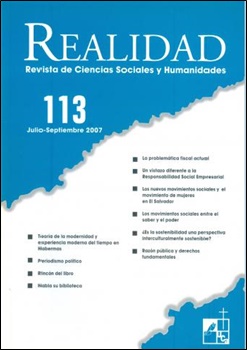Theory of modernity and modern experience of time in Habermas
DOI:
https://doi.org/10.5377/realidad.v0i113.3425Keywords:
SociedadAbstract
The following essay aims to show how, from the theoretical approaches by two authors, located in distant moments of the development of the modern society, as Hegel and Habermas, the paradoxes of Modernity posed by Walter Benjamin become evident: modernity is a model that assumes as normative the kind of development of certain societies in the planet. In this writing the modernization theory of Habermas will be discussed.
Realidad: Revista de Ciencias Sociales y Humanidades No. 113, 2007: 435-459
Downloads
1343
Downloads
Published
How to Cite
Issue
Section
License
© Realidad: Revista de Ciencias Sociales y Humanidades
Authors who publish in this journal accept the following conditions:
Realidad: Revista de Ciencias Sociales y Humanidades, provides open and immediate access to its content, based on the Open Access Policy of the Central American University "José Simeón Cañas"provides open and immediate access to its content.
According to the copyright legislation, Revista de Ciencias Sociales y Humanidades Journal published by the Universidad Centroamericana José Simeón Cañas, recognizes and respects the moral rights of the authors, as well as the ownership of the patrimonial right, which will be assigned to the journal for its diffusion in open access, in printed version and in digital format. By being part of multiple indexers, databases and reference systems, the articles published by Revista de Ciencias Sociales y Humanidades will be visible and available for downloading on these websites, indicating, in all cases, the authorship of the articles, the date of publication and the number of the journal to which they correspond.
You are free to:
- Share: copy and redistribute the material in any medium or format
- Adapt: remix, transform, and build upon the material
Under the following terms:
- Attribution: You must give appropriate credit, provide a link to the license, and indicate if changes were made. You may do so in any reasonable manner, but not in any way that suggests the licensor endorses you or your use.
- Non-Commercial: You may not use the material for commercial purposes.




